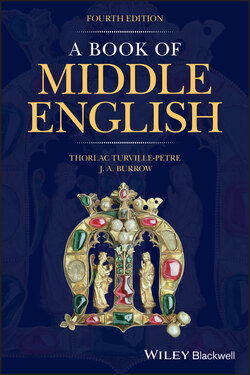Читать книгу A Book of Middle English - J. A. Burrow - Страница 42
4.4 Adjectives and Adverbs 4.4.1 Definite and Indefinite Inflexions
ОглавлениеAdjectives of one syllable ending in a consonant, e.g. old, add ‐e in the plural, and also in the singular in certain circumstances: when used with the definite article þe, a demonstrative adjective þis or þat, a possessive pronoun such as hir or our, or a name or other term of address. In other circumstances the adjective has no ending. This survival of the Old English definite (or ‘weak’) declension contrasting with the indefinite (or ‘strong’) declension may be observed up to the end of our period in the metre of careful writers of the South, such as Gower and Chaucer. Some examples are:
| singular | plural | ||
| indefinite (without | definite (with þe, | ||
| þe, demonstrative | þis, þat, hire etc.) | ||
| or possessive) | |||
| Text | |||
| 1: | god man (72) | þe ilce pining (76) | gode men (73) |
| 4: | lud dream (3) | his wide þrote (68–9) | sharpe word (30–1) |
| 5: | a gret ost (290) | þe selve way (341) | wide wones (365) |
| 13: | a chambre derk (205) | þis proude vice (11) | suche wiles (190) |
| 18a: | a whit thyng (447) | this white top (15) | wilde mares (211) |
The signs are that the inflexion of adjectives was maintained in written English long after it was effectively dead in the spoken language. Though it had a metrical and rhythmic function, it could not survive the general silencing of final ‐e, and increasingly throughout the fourteenth century scribal disregard for final ‐e played havoc with the poets’ rhythms. So in Sir Orfeo, written down in about 1340, there are forms with unhistorical ‐e, such as it bled wete rhyming with fet (5/79–80), and forms that lack ‐e, such as þis ich quen (5/63), where the metre would be improved with an extra syllable.
Adjectives of more than one syllable are usually inflected in earlier texts, though less regularly in later ones: so manifældlice miracles, ‘numerous miracles’, 1/81, þe muchele angoise, ‘the great anguish’, 4/25, diverse kinges, 13/65, oþre þinges, 13/66.
Adjectives that etymologically end in ‐e in their uninflected form, such as fre, grene, swete (OE frēo, grēne, swēte), remain unchanged throughout.
